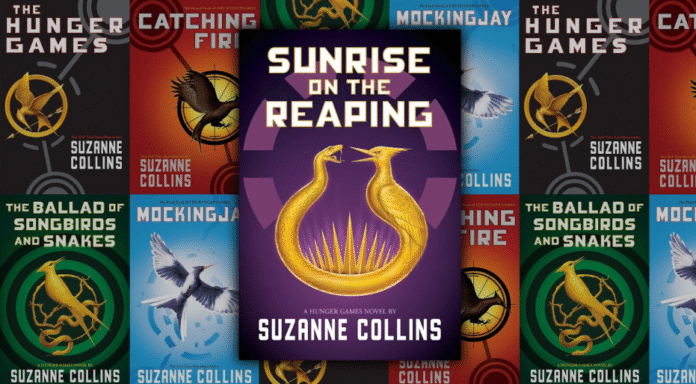By: Jessica A. Dennehy
Sunrise on the Reaping is the second prequel in the Hunger Games franchise, released on March 18, 2025. The novel sold over 1.5 million copies worldwide in its first week and has further cemented Suzanne Collins’ legacy as a captivating storyteller. Set during the 50th Hunger Games, the novel delves into the life of a young Haymitch Abernathy, offering deeper connections and insight to characters from the original trilogy.
Fans will also be excited to learn that a film adaptation is already in development, slated for release on November 20, 2026. Directed by Francis Lawrence, the film promises to explore the darker, more dystopian elements of Panem, centering on Haymitch’s harrowing experience in the brutal Second Quarter Quell.
Spoiler Warning: The following review contains mild spoilers. Proceed with caution.
The novel transports readers back to the 50th Quarter Quell—the Games famously won by Haymitch, the sardonic and beloved mentor of Katniss Everdeen and Peeta Mellark. While Catching Fire offered a brief overview of this portion of Hunger Games history, Sunrise on the Reaping fills in the emotional and narrative gaps with surprising depth.
The first portion of the book is devoted to building tension ahead of the Games themselves. While this buildup felt somewhat drawn out, I did appreciate how Collins utilized this period to interweave Haymitch’s story with many familiar characters. Seeing figures like Mags, Effie Trinket, Wiress, and even Plutarch Heavensbee through the eyes of a younger Haymitch brought a fresh perspective and unexpected emotional weight. I found Collins’ decision to humanize these side characters to greatly enrich the Hunger Games universe, especially for longtime fans.
However I will digress that the novel does lean heavily on the foundation laid by the original trilogy. Because of this, Sunrise on the Reaping doesn’t excel as a stand-alone novel, potentially not resonating to the same extent with readers unfamiliar with the original trilogy. It’s also worth noting that the story doesn’t hinge on shocking twists or unpredictable turns—the major events, after all, were already outlined in a chapter of Catching Fire. With that, I found that the climax didn’t deliver the kind of impact I was hoping for.
That said, Sunrise on the Reaping excels thematically.
One of the most striking elements of the novel was Collins’ decision to lean into Orwellian and Gothic tones. Drawing from the moral weight of Orwell and the psychological complexity of Poe, she took the literary elements of A Ballad of Songbirds and Snakes and the familiarity of District 12 to craft a gritty, sobering vessel for exploring the dehumanizing effects of systemic violence.
Most notably, the novel marks the beginning of Haymitch’s descent into alcoholism. Far from being the caricature of a grumpy drunk, he’s portrayed here as a deeply traumatized teenager, yet another victim to the Hunger Games. Doing whatever he can to survive the aftermath of the Games, his drinking is revealed to be not a personal flaw but a coping mechanism—a desperate effort to dull the memories of pain, failure, and loss. A failed partner and rebel, the origins to his self-destructive habits recontextualizes his entire presence in the original trilogy.
In parallel, the novel offers a chilling exploration of Coriolanus Snow’s growing ambitions. Where The Ballad of Songbirds and Snakes introduced us to a calculating but charming teenager, Sunrise on the Reaping reveals his transformation into something far more menacing. The book draws unsettling parallels between Snow’s relationships with all the District 12 victors—Lucy Gray, Haymitch, Katniss, and even Peeta. In each case, Snow manipulates and exploits, using personal interactions to advance his broader political agenda. While his ultimate rise isn’t fully realized here, we capture a glimpse of him rising to power…brutally.
I’ll admit I was initially skeptical of reimagining Haymitch from “depressed, snarky mentor” to “trauma-stricken survivor.” It’s a well-worn character arc that can often feel forced. But in this case, it worked. The emotional payoff is sincere and satisfying, answering long-standing questions about his past in a way that feels authentic and meaningful.
Ultimately, Sunrise on the Reaping succeeds in humanizing Haymitch and deepening the emotional impact of several other key characters. Its tone is darker and more critical than the original trilogy, but that weight feels earned.

